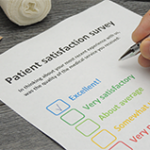In the Journal of the American Medical Association (JAMA) Forum, Diana Mason, PhD, RN, provided an example of a financially stressed hospital that encouraged employees to ensure high patient-satisfaction scores to enhance Medicare payments. Employees received customer service training and were compelled to prescribe more opioids to drug-seeking patients and order unnecessary tests per patients’ requests.9 This raises the concern that some hospitals may seek better reimbursement by improving patient satisfaction while jeopardizing other aspects of care.
Do highly satisfied patients receive better care and experience improved health outcomes? In 2012, Fenton et al conducted a four-year nationwide prospective cohort study that included 51,946 patients. Patient satisfaction was measured using the Customer Assessment of Health Plans Survey. The results showed that patients with high satisfaction scores had lower emergency department visits but had higher costs, rate of hospitalization, overall healthcare and prescription drug expenditures, and increased mortality.5
We can also take a look at the other side of this conundrum, which is physicians’ satisfaction with healthcare delivery. Zgierska et al conducted a study in which physicians were asked to provide their perceived effects of patient satisfaction ratings on their job satisfaction and clinical care. Results suggest that patient satisfaction survey utilization may promote, under certain circumstances, job dissatisfaction and inappropriate clinical care among some physicians.10,11
Conclusion
If I get sick, I would rather be treated correctly by healthcare providers having my best interest at heart, even if I am unsatisfied with certain aspects of my hospital experience, than be satisfied and die in the hospital from inappropriate care.
While patient satisfaction reports may reflect physicians’ interpersonal communication skills and help achieve the goal of patient-centered care, an overemphasis on patient satisfaction may have unintended adverse effects, such as promoting opioid addiction and overutilization of healthcare resources. Therefore, patient satisfaction reports should be used with caution.
 Zineb Aouhab, MD, RhMSUS, is an assistant professor in the department of rheumatology at Loyola University Medical Center in Maywood, Illinois. She is a member of the ACR’s Committee on Ethics and Conflict of Interest.
Zineb Aouhab, MD, RhMSUS, is an assistant professor in the department of rheumatology at Loyola University Medical Center in Maywood, Illinois. She is a member of the ACR’s Committee on Ethics and Conflict of Interest.
References
- Vuori H. Patient satisfaction—an attribute or indicator of the quality of care? QRB Qual Rev Bull. 1987 Mar;13(3):106–108.
- Carroll JG, Frankel RM, Keller A, et al (editors). The Medical Interview: Clinical Care, Education, and Research. Chapter 4: The interview as a clinical negotiation. Lazare A. (1995) New York: Springer-Verlag. pp 50–62.
- Epstein RM, Street RL Jr. The values and value of patient-centered care. Ann Fam Med. 2011 Mar–Apr;9(2):100–103.
- Kupfer JM, Bond EU. Satisfaction and patient-centered care necessary but not equal. JAMA. 2012 Jul 11;308(2):139–140.
- Fenton JJ, Jerant AF, Bertakis KD, Franks P. The cost of satisfaction. A national study of patient satisfaction, health care utilization, expenditures, and mortality. Arch Intern Med. 2012 Mar 12;172(5):405–411.
- Xiang X, Xu WY, Foraker RE. Is higher patient satisfaction associated with better stroke outcomes? Am J Manag Care. 2017 Oct 1;23(10):e316–e322.
- Jerant A, Fenton JJ, Kravitz RL, et al. Association of clinician denial of patient requests with patient satisfaction. JAMA Intern Med. 2018 Jan 1;178(1):85–91.
- Whittington JW, Nolan K, Lewis N, Torres T. Pursuing the Triple Aim: The first 7 years. Milbank Q. 2015 Jun;93(2):263–300.
- Mason D. Does linking payment to patient satisfaction harm or help? JAMA Forum. 2015 Jun 17.
- Zgierska A, Rabago D, Miller MM. Impact of patient satisfaction ratings on physicians and clinical care. Patient Prefer Adherence. 2014 Apr 3;8:437–446.
- Zgierska A, Miller M, Rabago D. Patient satisfaction, prescription drug abuse, and potential unintended consequences. JAMA. 2012 Apr 4;307(13):1377–1378.
